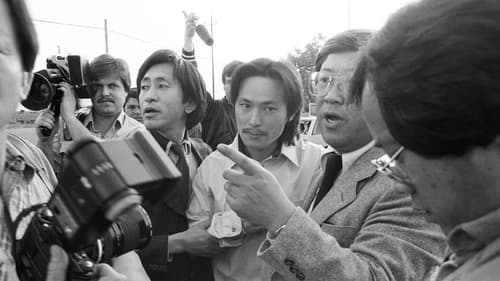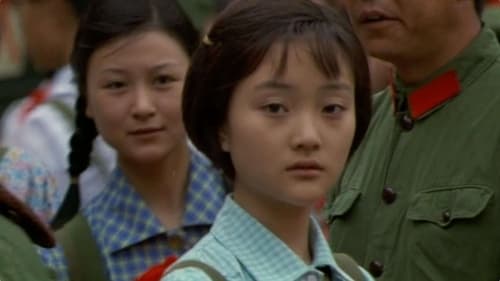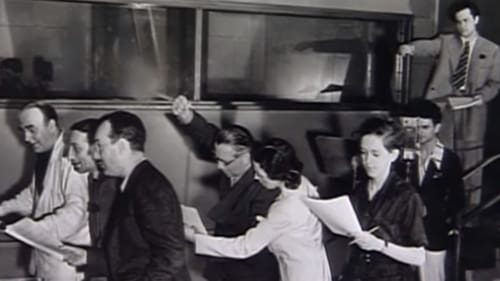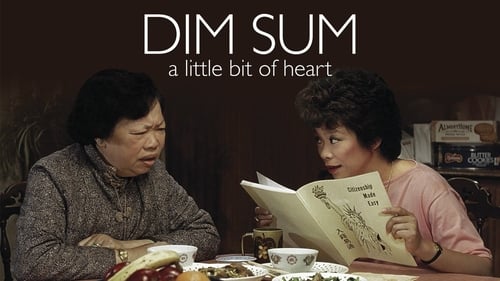
Camera Operator
On June 3, 1973, a man was murdered in a busy intersection of San Francisco’s Chinatown as part of an ongoing gang war. Chol Soo Lee, a 20-year-old Korean immigrant who had previous run-ins with the law, was arrested and convicted based on flimsy evidence and the eyewitness accounts of white tourists who couldn’t distinguish between Asian features. Sentenced to life in prison, Chol Soo Lee would spend years fighting to survive behind bars before journalist K.W. Lee took an interest in his case. The intrepid reporter’s investigation would galvanize a first-of-its-kind pan-Asian American grassroots movement to fight for Chol Soo Lee’s freedom, ultimately inspiring a new generation of social justice activists.

Cinematography
MAKERS: Once And For All is a feature film presented by AOL that tells the story of the Fourth World Conference on Women, Beijing 1995 as a watershed event in the global struggle for women's rights. With original interviews with subjects, including Hillary Clinton, and archival footage, the film captures the suspenseful months leading up to Beijing and the high-stakes drama of the event itself. Through the eyes of global leaders and grassroots women, it offers a window into Beijing's historic days, its impact, and its unfinished legacy. The feature documentary will memorialize this unprecedented moment in time and reignite momentum for lasting change.

Director of Photography
Jazz pianist Mary Lou Williams was a genius ahead of her time. From child prodigy to "Boogie-Woogie Queen" to groundbreaking composer to mentoring some of the greatest musicians of all time, she never ceased to astound those who heard her play. But for a Black woman in the early 1900s, life as a star did not come easy.

Director of Photography
Documentary on ethnic relations in Brazil.

Director of Photography
The Haitian Revolution represents the only successful slave revolution in history; it created the world's first Black republic --- traumatizing Southern planters, inspiring U.S. Blacks, and invigorating anti-slavery activist world-wide. At the forefront of the rebellion was General Toussaint Louverture, an ex-slave whose genius was admired by allies and enemies alike.

Director of Photography
In 1965, Patsy Takemoto Mink became the first woman of color in the United States Congress. Seven years later, she ran for the US presidency and was the driving force behind Title IX, the landmark legislation that transformed women’s opportunities in higher education and athletics.

Director of Photography
Ten families read letters from their loved ones killed during Operation Iraqi Freedom in this powerful and moving HBO documentary by Oscar and Emmy Award-winning filmmaker Bill Couturie (Dear America: Letters Home from Vietnam). Photos of the soldiers in military and civilian life are shown as family members read the final correspondence received from Iraq and share their thoughts and memories about the fallen troops and the realities of war.

Director of Photography
Michael Cimino's "Heaven's Gate" stands as one of the most influential and important films of all time; one that changed the movie industry in ways nobody ever expected. "Final Cut: The Making and Unmaking of Heaven's Gate" is a captivating, cutting, and thorough look at the long production and crushing failure of the epic film that destroyed a great motion picture studio.

Director of Photography
Japan blossomed into its Renaissance at approximately the same time as Europe. Unlike the West, it flourished not through conquest and exploration, but by fierce and defiant isolation. And the man at the heart of this empire was Tokugawa Ieyasu, a warlord who ruled with absolute control. This period is explored through myriad voices-- the Shogun, the Samurai, the Geisha, the poet, the peasant and the Westerner who glimpsed into this secret world.

Director of Photography
Documentary about the final five, turbulent years in the life of civil rights activist Martin Luther King. The story begins at the Lincoln Memorial in August 1963, when a 34-year-old preacher galvanized millions with his dream for an America free of racism and comes to a bloody end five years later on a motel balcony in Memphis. King has since become a mythic figure, an activist whose works and image are more hotly contested, negotiated and sold than almost anyone else's in American history. (Storyville)

Director
Two thousand years ago, in the Roman province of Judea, Jesus was crucified by imperial troops. Thousands before him had suffered the same fate. But unlike his predecessors on the cross, Jesus did not disappear from history. Instead, his memory was kept alive by a small band of Jews - men and women who held fast to their conviction that Jesus was the Messiah.

Director
Documentary filmmakers offer a fascinating look at one of the most spectacular engineering feats of the 19th Century as the story of the Transcontinental Railroad comes to life in a film that's sure to appeal to historians and railroad enthusiasts alike. As legions of tireless workers toiled for six years to realize the vision of shady entrepreneurs and imaginative engineers, the remarkable railway dream slowly became a reality. But not everyone was so pleased with the remarkable achievement. Despite the devastating effect that the tremendous transportation breakthrough would have on the Native American population, the lasting impact of the Transcontinental Railroad on the politics and culture of a rapidly expanding country would forever mark it as an invaluable component of the American success story.

Camera Operator
City of the Century chronicles Chicago's dramatic transformation from a swampy frontier town of fur traders and Native Americans to a massive metropolis that was the quintessential American city of the nineteenth century. The film tells how innovation, ingenuity, determination and ruthlessness created empires in what was a marshy wasteland and describes the hardships endured by millions of working men and women whose labor helped a capitalist class reinvent the way America did business. Along the way, this program revels in Chicago's triumphs -- among them the architectural experimentation that gave the city one of the world's most distinctive skylines -- and delves into the heart of Chicago's painful struggles. Bringing to life the Windy City's rich mixture of cultures, its writers and journalists, its political corruption and labor upheavals, this film bears witness to the creation of one of the most dynamic and vibrant cities in the world.

Camera Operator
Jimmy Carter ran for president on a wave of post-Watergate disaffection with Washington politics. But inexperience, inflation, recession, and the Iran hostage crisis, derailed his presidency dramatically. His crowning achievement, the Camp David Accords, created a framework for Middle East peace, inspiring his life since. The film traces his ascent from Plains, Georgia, to the Oval Office and explores the role of religion in his career. This is the first of two parts.

Director of Photography
Showtime's "In the 20th Century" is a millennium-related strand of feature-length documentaries in which famous directors take on major subjects of their choosing. In the third of the six films, "Yesterday's Tomorrows," filmmaker Barry Levinson delves into what we, as Americans, thought the future would be as we traveled through the 20th century. Houses and cars of the future, the promise of technology, and the other hopes and dreams of the early part of the century gave way to the fears and anxieties brought about by the atomic age and the Hollywood disaster films that followed. Soon we wondered if we could control technology, or if it would control us. This film is by turns light-hearted and thoughtful, and rare historical and archival film, produced by government and industry, alternates with on-screen interviews with people as diverse as consumer advocate Ralph Nader, cartoonist Matt Groening, futurist Alvin Toffler, comedienne Phyllis Diller, and actor Martin Mull.

Director of Photography
With its four operas, seventeen-hour running time and months of rehearsal, Wagner's "Ring Cycle" is a daunting undertaking for any opera company. Jon Else goes backstage to show this rare event entirely from the point of view of union stagehands at the San Francisco Opera.

Director of Photography
Young teen girl Xiu Xiu is sent away to a remote corner of the Sichuan steppes for manual labor in 1975 (sending young people to there was a part of Cultural Revolution in China). A year later, she agrees to go to even more remote spot with a Tibetan saddle tramp Lao Jin to learn horse herding.

Camera Operator
Documentary on water usage and the growth of the American west, shown on PBS as a four-part miniseries

Director of Photography
Documentary about the battle between Orson Welles and William Randolph Hearst over Welles' Citizen Kane (1941). Features interviews with Welles' and Hearst's co-workers also as a relative complete bio of Hearst.

Director of Photography
The career of iconic and influential poet and writer Audre Lorde is seen up until death.

Director of Photography
Narrated by actress Alfre Woodard, this trenchant, eye-opening doc traces the radical civil rights leader’s life from his tumultuous childhood, through his rise in the ranks of the Nation of Islam, to his 1965 assassination.

Director of Photography
Just before the advent of the Great Depression, Henry Ford controlled the most important company in the most important industry in the booming American economy. His offer of high wages in exchange for hard work attracted workers to Detroit, but it began to come apart when Ford hired a private police force to speed up production and spy on employees. After the depression hit in 1929, these workers faced a new, grim reality as unemployment skyrocketed.

Director of Photography
A documentary about Forbidden City, a San Francisco Chinese-American nightclub open from the 1930s to the 1960s.

Director of Photography
A poet from Haiti flees to America after being imprisoned in his native country. Recovering from the experience, he begins to examine his past. One day he encounters his former torturer, and becomes obsessed with taking his revenge.

Director of Photography
Allen Fong portrays the strains of marriage through the eyes of a young couple.

Director of Photography
San Francisco's Richmond District. A widow welcomes the Chinese New Year. 62 years old, she wants to make a trip to China to pay last respects to her ancestors. A fortune teller has told her this is the year she'll die, and a daughter, Geraldine, remains unmarried. Geraldine's boyfriend lives in Los Angeles and she's not sure she's ready for marriage, nor does she want to leave her mother alone in her declining years. Mrs. Tan's cheerful brother-in-law, Uncle Tam, tries to help out.

Director of Photography
The story of Native Americans seeking to reconnect with their spiritual roots while incarcerated.

Director of Photography
Two cabbies search San Francisco's Chinatown for a mysterious character who has disappeared with their $4000. Their quest leads them on a humorous, if mundane, journey which illuminates the many problems experienced by Chinese-Americans trying to assimilate into contemporary American society.

Camera Operator
Two cabbies search San Francisco's Chinatown for a mysterious character who has disappeared with their $4000. Their quest leads them on a humorous, if mundane, journey which illuminates the many problems experienced by Chinese-Americans trying to assimilate into contemporary American society.



























